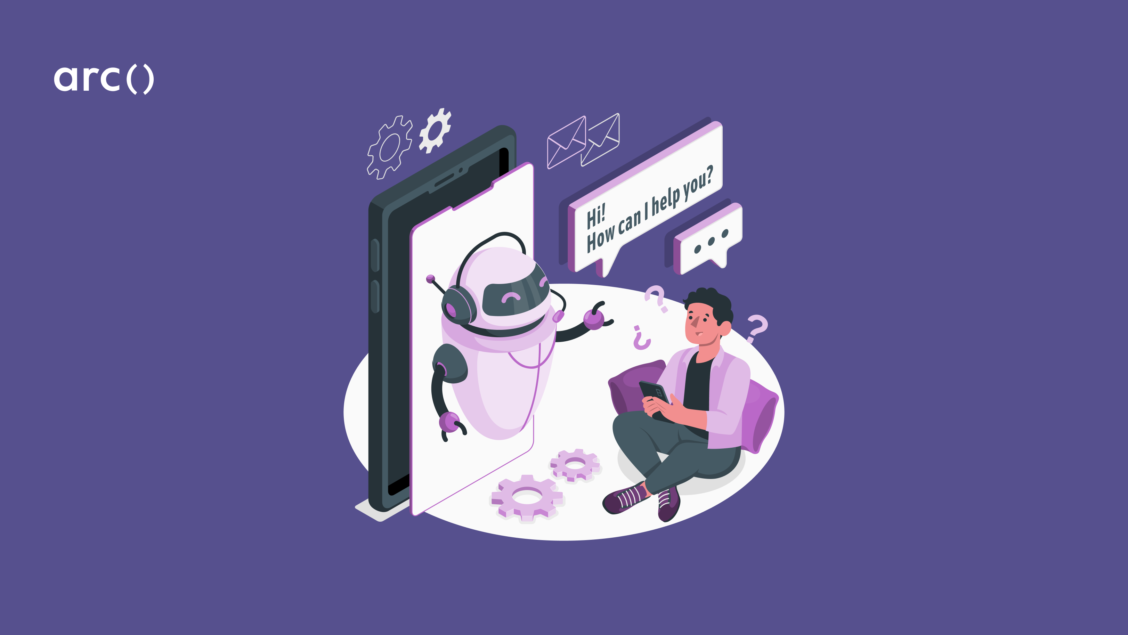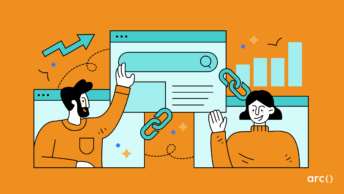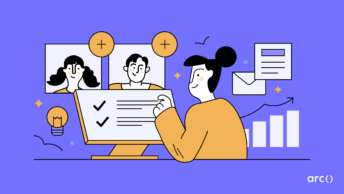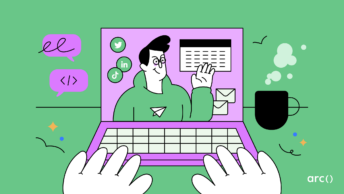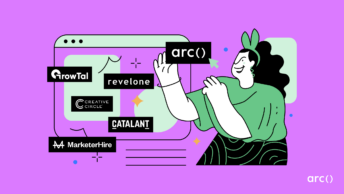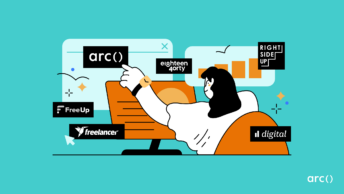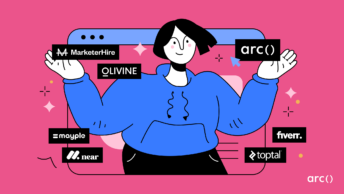As AI continues to infiltrate every part of our lives, recruiters and hiring managers are navigating how to work with AI to help them hire better and faster. In this article, we’re going to cover real ways to use AI today, AI tools that real recruiters are using to make their jobs easier, and how AI can help with DEI initiatives.
To help recruiters and HR professionals navigate tech hiring in an AI world, we interviewed three experts in the recruiting landscape: Mariana Gesto from Pierpoint, Shannon Ogborn from Ashby, and Matt Alder from Recruiting Future. In this article, we’ll walk through a couple of topics revolving around AI and recruitment:
- How recruiters are actually using AI today
- Which AI tools to add to your hiring process
- How to view AI when candidates use it
- How to avoid legal pitfalls when using AI
- How to use AI to achieve DEI goals
Watch the full talk below, or read on for some of the key take-home information!
Looking for top talent fast? See how Arc can help you:
⚡️ Find developers, designers, marketers, and more
⚡️ Freelance or full-time remote + fully vetted
⚡️ Save up to 80% with global hires
Hire top talent with Arc risk-free →
How recruiters are actually using AI today
How is artificial intelligence changing the recruiting process? Oftentimes, the first question that comes up when discussing AI and recruiting is: Will AI replace recruiters? When we asked our panelists their thoughts, they all agreed that AI’s development has prompted a paradigm shift in talent acquisition. However, that paradigm shift has nothing to do with recruiters being replaced and has everything to do with augmented intelligence, which is a model centered on human-AI collaboration that boosts cognitive capabilities such as learning, decision-making, and the creation of novel experiences.
So what exactly are hiring managers using artificial intelligence in recruitment? What are the benefits of using AI in recruitment? The most common recruitment AI use cases include automating tasks like sourcing qualified candidates, screening resumes, scheduling interviews, and other resource-intensive and repetitive tasks. According to Mariana, senior talent acquisition specialist at Pierpoint, AI enables recruiters to:
- Engage more deeply in candidate relationship
- Build strategic workforce planning
- Align efforts with organizational objectives in a leaner manner
- Save time on operational tasks
- Work on things only humans can do, like identifying nuance and cultural traits
- Use data to analyze the quality of hires
Which AI tools are recruiters using?
When it comes to AI tools, many automatically think of ChatGPT. While ChatGPT is certainly revolutionizing the tech world, including recruitment, it is only one of the many innovative tools out there that recruiters can use to streamline the hiring process.
In response to “which AI tools are you and your team using?”, our panelists shared two tools: Trovinto and MetaView.
Trovinto: AI-powered interview guide for any role
Trovinto is a tool that helps recruiters generate interview questions and score and evaluate candidates. Trovinto provides tailor-made interview questions based on the job description recruiters upload. As Trovinto is built on Natural Language Understanding and Machine Learning, the AI can grasp the meaning of a job description, understand the role in detail, and provide reasons for which questions to ask a candidate. As Mariana, senior talent acquisition specialist at Pierpoint, shared:
MetaView: Automatically writes your interview notes
To make the interviewing process more effective and unbiased, Matt and Shannon both suggested using MetaView. As Matt shared, MetaView analyzes the transcripts for interviews conducted and sees if there are any biases. It also provides recruiters with feedback on how well the interview went. According to Shannon, community lead & recops consultant at Ashby:
Now, if recruiters are using AI to find the perfect talent, job seekers must also be using AI to help them land their dream jobs. Should recruiters be worried about candidates using AI? Let’s see what our panelists had to say.
How should recruiters view candidates’ use of AI
While some recruiters and hiring managers may be worried and think that candidates who use AI in their job-hunting journey are essentially “cheating,” Shannon thinks otherwise. Instead of framing the use of AI as “cheating,” she believes knowing how to implement AI shows a candidate’s level of resourcefulness. To demonstrate her point, she used an analogy:
As you can see from the analogy, there is no right or wrong answer. It all comes down to what your company believes in and how you want to approach AI in your talent acquisition process. What’s most important is for your company to determine your stance and for you to communicate your stance clearly to your candidates.
How to avoid legal pitfalls when using AI
While there are many benefits to incorporating AI into your hiring process, there are also certain legal considerations recruiters and companies should be aware of. For example, in New York, a law has been put into place recently that states if a company uses AI to make hiring decisions in any capacity, such as application review and screening candidates, they must inform candidates of this. Companies must also submit this information to an audit to prove that AI tools are not causing adverse impacts on protected groups. So how should recruiters respond to the laws? Here’s what Matt thinks:
Instead of taking a fearful posture, Shannon believes that HR professionals should play their part by understanding current laws and regulations as well as entering into the decision-making process. As Shannon stated:
With that being said, most laws surrounding AI and recruitment are essentially being drafted and put into place to promote diversity and equality. With proper use and tracking, AI can actually help boost DEI initiatives.
How to use AI to achieve DEI goals?
When it comes to AI and DEI (diversity, equity, and inclusion), AI is almost secondary as understanding where your company is at and where you want to get to in terms of DEI is more important. Regardless of whether AI is involved or not, when beginning to implement DEI initiatives, it is highly recommended to first assess the current state of your company, determine the desired future state, and establish concrete and specific goals. Many companies struggle in this area by setting goals that lack specificity, which is a significant shortfall.
Shannon believes “the biggest deficit or gap is that a lot of companies create goals that are not specific enough.” For instance, many Ashby customers said they’d like to reach 50/50 representation for men and women. While having 50% of women represented in a company would be amazing, in reality, reaching 50% is not a realistic goal for most organizations. As such, it’s important to be honest about where the company stands, what it should aim for, and how to reach its DEI goals.
Now, bringing AI into the picture, Mariana believes that:
To add to the conversation about DEI, Matt said:
To leverage AI more and tackle unconscious bias, here are two DEI-focused tools recruiters should consider using to make the hiring process more transparent and inclusive: Mathison and Mentra.
Mathison: Measure, benchmark, and take action on DEI goals
Mathison is a platform for building more equitable and inclusive workplaces. Mathison has pioneered the first DEI Operating System to give employers a single place to manager their:
- DEI measurement, benchmarking, and reporting
- Diversity sourcing to expand the hiring pipeline
- DEI training and tools to shift behavior and reduce bias
Mathison is designed to seamlessly integrate with an organization’s current systems, offering DEI tools that can be effortlessly incorporated into the daily workflows of all employees, along with a comprehensive dashboard displaying DEI metrics for leaders.
Mentra: LinkedIn for neurodivergent talent
Mentra, the Charlotte, N.C.-based startup, whose three co-founders are all autistic, built this AI-powered network that specifically caters to neuroinclusive employment. Backed by Sam Altman, Mentra uses AI to parse through job descriptions to make sure they’re cognitively accessible and broken down in a consistent format that is not exclusionary.”
According to Mentra’s homepage:
“Mentra is a neurodivergent-friendly talent platform that intelligently matches neurodiverse individuals with employers that value their strengths. Mentra puts recruiters in front of candidates rather than forcing them to navigate through the challenging process of finding a job.”
Its AI goes beyond traditional job requirements by integrating a holistic understanding of the individual’s personality, environmental preferences, skills levels, and ideal job. If your company is looking to expand your talent pool to include neurodivergent folks, Mentra is the tool you’re looking for. By using tools like Mentra, you’ll be able to access talent you may otherwise miss.
Conclusion
In conclusion, as AI becomes increasingly integrated into various aspects of our lives, recruiters and hiring managers are adapting to its use to improve and expedite the hiring process. Rather than replacing recruiters, AI is fostering a shift toward augmented intelligence, emphasizing human-AI collaboration to enhance cognitive abilities.
In navigating AI in the recruitment process, it is crucial for HR professionals and recruiters to remain informed, adaptable, and committed to creating more equitable and efficient hiring processes. By leveraging AI thoughtfully and in alignment with their organizational values, they can enhance the overall quality and diversity of their talent pipelines.


